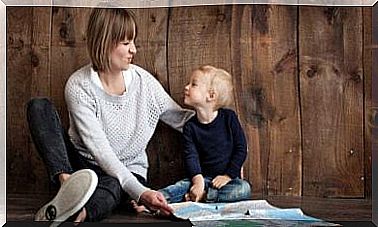Study Finds Children Of Older Mothers Healthier Emotionally – You Are Parents
Older mothers face many challenges when motherhood arrives late. However, many of the women who have gone through this experience have revealed that it has worked well for them and are happy with their decision. Of course we believe them, but something else is happening. The researchers found that their children were also happier and in better emotional health.
A study of some 4,000 Danish women found that children of older women had fewer emotional problems. In this sense, late motherhood brought common benefits to mothers and children. The mothers of these children are balanced, they know what they want, and have been successful in many ways.
Despite these results, scientists do not want to say that with other women it does not happen the same way. We are children of mothers of different ages, and it cannot be said that most of us suffer from emotional difficulties. However, this type of research reveals some remarkable discrepancies.
Why Do Older Women Have Emotionally Healthier Children?
The study focused on observing the education of children at various stages. More than 4,700 mothers over the age of 33 participated in the research. The behavior of the children was analyzed in three stages, at 7 years old, then at 11 years old and finally at 15 years old.
Among the main findings of the research is the type of punishment practiced by these mothers. For example, there were fewer physical and verbal reprimands. These women are a little more understanding with their children, they guide them in a gentle way and without teaching too much. Apparently, according to experts, this means that these children are not touched by hurtful words, injustices and even less by abuse.
They explain in detail that when children are 7 years old, they have less emotional, behavioral and social difficulties. This is maintained at least until the age of 11. However, as in all cases, when children reach the age of 15, the picture changes. The minds of teenagers are changing anyway, but when they are sons of older mothers, the change is not so drastic.
In reaching a conclusion, the researchers took other factors into account. For example, the financial situation of the family and the level of education of this one. They concluded that the patience with which these mothers educate is something they have acquired over the years.
The benefits of education with an older age
In addition to the patience with which they raise their children, another advantage of education at this stage is life expectancy. Older mothers have experienced good and bad in different ways. Those who were not mothers may be less concerned about their health and less far-sighted. However, when you are older, you fear a tragic outcome more. Therefore, when motherhood arrives late, life expectancy increases.

Previous studies have shown that the life expectancy of women who have children after the age of 35 increases by up to 50%. In other words, they are 50% more likely to reach age 95, compared to those who became mothers between the ages of 20 and 29.
Other benefits discovered in 2016 are that children of older mothers tend to be taller and smarter. Although we know that this is not a hindrance for others. All of our children are beautiful and intelligent. However, this data comes from studies which have shown that a population of 1.5 million people born to older women is in better physical shape. Another characteristic was the best school marks.
Studies of motherhood in women over the age of 50 have found that they have more energy than you might think. In most cases, these women became mothers through egg donation. In addition, these treatments are difficult but their energy level is higher.
Additionally, experts have not been able to determine why children of older mothers are emotionally healthier. They also cannot assert the reason why they possess other remarkable qualities. They assume, however, that it is linked to their genes.









